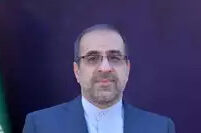It has been 39 days since the tragic helicopter crash that claimed the life of Iranian President Ebrahim Raisi on May 19. Presidential elections are being held in Iran today, June 28. Four polling centers; Delhi, Mumbai, Pune, and Hyderabad have been established to facilitate over 3,000 Iranians living and working in India. Currently, voting for Iran’s presidential election is underway at the Iranian embassy in Delhi.
#WATCH | Ambassador of Iran to India, Iraj Elahi casts his vote for the presidential election of Iran at the Iranian embassy in Delhi.
Iran lost its serving president Ebrahim Raisi in a helicopter crash on May 19. pic.twitter.com/vrGnaXq8nR
Related News— ANI (@ANI) June 28, 2024
Out of the 400 candidates who registered to contest, Iran’s Ministry of Interior accepted 80, and from them, six were shortlisted. Two have since withdrawn, leaving four candidates: the current Speaker Mohammad Baqer Qalibaf (Conservative), diplomat Saeed Jalili (Conservative), cleric Mostafa Pourmohammadi (Conservative), and lawmaker Massoud Pezeshkian (Reformist).
“In Iran, the President is elected by the people, so we are urging all Iranians to come out and vote. The results will be declared on June 29. In Iran, if the President dies an unnatural death during his term, the Presidential elections are held within 50 days. We are optimistic that the Iranians in India will come out and vote,” Ambassador Elahi added.
Meanwhile, Iran has recently become a member of the Shanghai Cooperation Organisation (SCO) and is looking forward to participating in the upcoming Summit in Astana.
“India’s role and position in both SCO and BRICS is significant. It is up to India to decide who they send for the Summit. At present, India, Russia, and China have emerged as major powers in the world and will pave the way for a new international order. The world is at a critical point with conflicts raging and economies suffering,” he added.
The Ambassador also discussed the importance of trade in local currencies, noting that India and Iran had traded in local currencies in the past and are likely to resume once a few technical issues are resolved.
“The world today has two options – either to accept sanctions as they are or to look for alternatives. These alternatives include trade in local currencies. The economy is the driver for change, and sanctions have impacted Iran and Russia,” the Ambassador said, adding that India has always supported Iran, including its becoming a member of BRICS.













